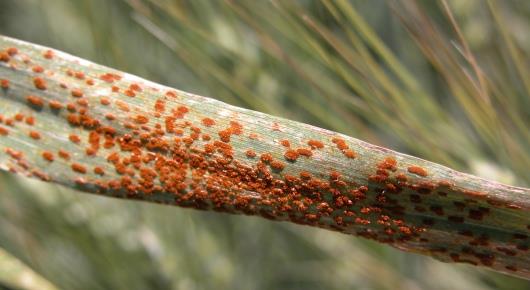FAO publication timed right for Europe’s wheat rust crisis

Wheat stem rust is making advances in Europe, Africa, and Asia, threatening food sources and livelihoods for more than one billion people. Carried by wind, wheat rust spores can spread rapidly over long distances, causing crop losses of up to 100 percent in untreated or susceptible wheat varieties.
FAO has published a new book in Russian that summarizes 25 years of scientific research on wheat diseases, providing scientists with important findings on plant protection and breeding and offering practical value to farmers, large commodity producers, and plant protection specialists.
Crops contaminated with wheat rust are marked by yellow leaves, black stems, and shrivelled grains. The disease is a serious problem in many countries, hitting small holders especially hard.
“Developing resistant wheat varieties and promoting them to the farmers’ fields is the key to limit damage and fight against aggressive rusts and other diseases,” said FAO agricultural officer Hafiz Muminjanov. “The new book presents valuable information for both scientists and farmers to better understand the nature of wheat diseases and apply an integrated approach for sustainable increase of yield.
“Monitoring and surveillance of diseases, screening commercial and farmers’ wheat varieties on hot spots, and use of artificial inoculation are important steps to prevent losses.”
Aggressive wheat rust races are a serious threat to regional food and nutrition security, Muminjanov added. Continuous surveillance and programmatic management of the disease are essential.
Murat Koyshibayev, author of the 365-page book, has worked for more than 25 years in close cooperation with the International Maize and Wheat Improvement Center and the International Center for Agricultural Research in the Dry Areas. He also has participated in many expeditions organized by FAO to conduct phytosanitary surveys of wheat crops in Central Asia and Northern Kazakhstan.
“The new book presents valuable information
for both scientists and farmers to better understand the nature of wheat diseases and apply an integrated approach for sustainable increases in yield.”
Hafiz Muminjanov
FAO Agricultural Officer
As a member of the Borlaug Global Rust Initiative, FAO supports efforts to monitor and manage wheat rust diseases. It plays an important role in training officers and farmers, strengthening connections among institutions and stakeholders, and enhancing relationships among researchers, extension organizations, and farmers. FAO also helps with emergency responses when necessary.
In the fight against wheat diseases, FAO provides rust experts from affected countries with technical support and training to improve their ability to detect and effectively cope with emerging wheat rust races. It also provides a forum for conducting surveys and collecting rust samples for new investigations.
22 February 2018, Budapest, Hungary
